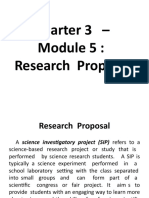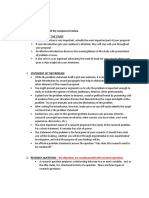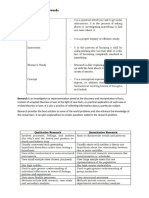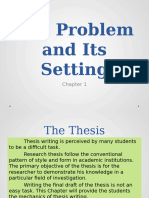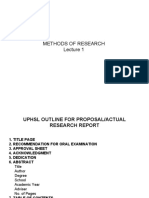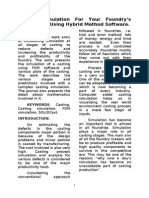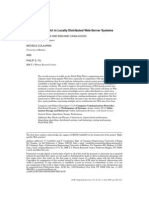0 ratings0% found this document useful (0 votes)
18 viewsMODULE 2 Research Tatay
MODULE 2 Research Tatay
Uploaded by
Jomar morabeA research problem involves areas that researchers want to improve, difficulties they want to eliminate, or questions they want to answer. A thesis or dissertation is submitted in support of a degree and presents the author's research and findings. Thesis can refer to parts of a bachelor's or master's course while dissertation is normally for a doctorate.
Possible sources of problems include interviews, work experience, and more. Characteristics of a good problem include being interesting to researchers and the field, novel, able to be completed in the allotted time without ethical issues. A good problem must interest the researcher so they are motivated to solve problems that arise. Research titles should be stated generally or specifically and consider measures for a good title.
Copyright:
© All Rights Reserved
Available Formats
Download as DOCX, PDF, TXT or read online from Scribd
MODULE 2 Research Tatay
MODULE 2 Research Tatay
Uploaded by
Jomar morabe0 ratings0% found this document useful (0 votes)
18 views3 pagesA research problem involves areas that researchers want to improve, difficulties they want to eliminate, or questions they want to answer. A thesis or dissertation is submitted in support of a degree and presents the author's research and findings. Thesis can refer to parts of a bachelor's or master's course while dissertation is normally for a doctorate.
Possible sources of problems include interviews, work experience, and more. Characteristics of a good problem include being interesting to researchers and the field, novel, able to be completed in the allotted time without ethical issues. A good problem must interest the researcher so they are motivated to solve problems that arise. Research titles should be stated generally or specifically and consider measures for a good title.
Copyright
© © All Rights Reserved
Available Formats
DOCX, PDF, TXT or read online from Scribd
Share this document
Did you find this document useful?
Is this content inappropriate?
A research problem involves areas that researchers want to improve, difficulties they want to eliminate, or questions they want to answer. A thesis or dissertation is submitted in support of a degree and presents the author's research and findings. Thesis can refer to parts of a bachelor's or master's course while dissertation is normally for a doctorate.
Possible sources of problems include interviews, work experience, and more. Characteristics of a good problem include being interesting to researchers and the field, novel, able to be completed in the allotted time without ethical issues. A good problem must interest the researcher so they are motivated to solve problems that arise. Research titles should be stated generally or specifically and consider measures for a good title.
Copyright:
© All Rights Reserved
Available Formats
Download as DOCX, PDF, TXT or read online from Scribd
Download as docx, pdf, or txt
0 ratings0% found this document useful (0 votes)
18 views3 pagesMODULE 2 Research Tatay
MODULE 2 Research Tatay
Uploaded by
Jomar morabeA research problem involves areas that researchers want to improve, difficulties they want to eliminate, or questions they want to answer. A thesis or dissertation is submitted in support of a degree and presents the author's research and findings. Thesis can refer to parts of a bachelor's or master's course while dissertation is normally for a doctorate.
Possible sources of problems include interviews, work experience, and more. Characteristics of a good problem include being interesting to researchers and the field, novel, able to be completed in the allotted time without ethical issues. A good problem must interest the researcher so they are motivated to solve problems that arise. Research titles should be stated generally or specifically and consider measures for a good title.
Copyright:
© All Rights Reserved
Available Formats
Download as DOCX, PDF, TXT or read online from Scribd
Download as docx, pdf, or txt
You are on page 1of 3
MODULE 2
Evaluation Chunk #1
1. What is a research problem?
Research problem is an issue or concern that an investigator
presents and justifies in a research study.
Research problem involves areas of concerns to researchers for
condition they want to improve, difficulties they want to eliminate,
and questions for which they want to seek answers.
2. What is the difference between a thesis and a dissertation?
A thesis or dissertation is a document submitted in support of
candidature degree of professional qualification presenting the
author’s research and findings.
Thesis is also referring to the general claim of an essay or similar
work.
In some countries/universities, the word “thesis” or a cognate is
used as a part of a bachelor’s or master’s course, while
“dissertation” is normally applied to a doctorate, while in others,
reverse is true.
Dissertation can be at times be used to describe a treatise without
relation to obtaining an academic degree.
3. List at least four (4) possible sources of problems.
Interview
Work experience
T
4. Enumerate at least four (4) characteristics of a good problem.
Interest of the topic
Useful for the concerned people in a particular field
A good problem is possessing novelty
A good problem is one which invites more complex designing
A good problem can be completed in the alloyed time desired
A good problem does not carry ethical or moral empidements.
5. Why is it that a good problem must be of great interest to the researcher?
This factor is considered important because if you are really
interested in the problem you wish to work on, it will be easy for
you to surmount any impending problems that may come along the
way.
6. What are the different considerations of presenting a good title?
The statement of a good problem can be expressed either general
or specific. Basically every research starts with a problem or
problems. On the other hand, after selecting a theme or topic to
write on, the researcher considers the title of the research and
criterion measurers exist for presenting a good one.
MODULE 2
Evaluation Chunk #2
1. What are meaning of thesis?
A thesis or dissertation is a document submitted in support of
candidature degree of professional qualification presenting the
author’s research and findings.
2. What are different sources of problems?
Problems may raise anywhere, there are so many problems around
us, some problems are easy to solve but problems in research
require time and intensive effort. The following sources are;
Interview
Work experience
3. What are different characteristics of a good problem?
A good problem is possessing novelty
A good problem is one which invites more complex
designing
A good problem can be completed in the alloyed time
desired
A good problem does not carry ethical or moral
empidements
4. How do we state the problem of research report?
The statement of the problem can be stated generally or
specifically.
5. How can we make the research problem specific?
After the selection of the theme or topic to write on, the
researcher considers the title of the research and what
criterion measures exist for presenting a good one.
6. What are the different considerations in writing a good title of
the research?
After writing the title of the research based on criterion
measures, it is necessary to formulate the hypothesis of
our research or thesis.
7. What is the difference of hypothesis to an assumption?
A hypothesis is an educated guess about the answer to a
scientific question. A researcher trying to discover the
relationship between two variables must believe that the
relationship between the two variables exists and can be
discovered. This belief is called research assumption. The
most basic assumption in research is that every thing in
this world works under a certain system. It is the job of a
researcher, therefore, to discover the system believed to
exist. That system can be predicted in advance based on
theory or logical common sense. That prediction is called
research hypothesis. Research hypothesis is of at least
three kinds, each of which should not be confused.
8. What are the functions of hypothesis in a research or thesis?
As stated previously, a hypothesis functions as an
answer to the research question and guides data
collection and interpretation. A hypothesis enables
researchers not only to discover a relationship between
variables, but also to predict a relationship based on
theoretical guidelines and/or empirical evidence.
9. How can we consider a hypothesis as good one?
Good hypotheses are testable hypotheses. This means
that one can actually carry out the intent of the question
reflected by the hypoth- esis. For example, number of
hours of parental reading and outcome scores as
measured by a test of comprehension are all objective
and can be incorporated reliably.
10. What are the different types of hypothesis and how they differ
from each other?
The hypothesis can be inductive or deductive, simple or
complex, null or alternative. While the null hypothesis
is the hypothesis, which is to be actually tested, whereas
alternative hypothesis gives an alternative to the null
hypothesis. Null hypothesis implies a statement that
expects no difference or effect.
You might also like
- Production DepartmentDocument37 pagesProduction DepartmentMeena Sivasubramanian100% (1)
- (Cambridge Studies in Philosophy) D. M. Armstrong - A World of States of Affairs (1997, Cambridge University Press)Document300 pages(Cambridge Studies in Philosophy) D. M. Armstrong - A World of States of Affairs (1997, Cambridge University Press)Junior Pires100% (2)
- Presentation On CrankshaftDocument20 pagesPresentation On CrankshaftSachin Kumar100% (7)
- Methods of ResearchDocument35 pagesMethods of ResearchJomar morabe100% (3)
- Module 2Document4 pagesModule 2Jonamay Dela RosaNo ratings yet
- Research Methodology Unit 2Document7 pagesResearch Methodology Unit 2Prasad BulbuleNo ratings yet
- Week 5Document21 pagesWeek 5ghaffarkhan21382No ratings yet
- Chapter TwoDocument24 pagesChapter TwoTesfu HettoNo ratings yet
- Research MethodologyDocument7 pagesResearch MethodologyMary Grace CantubaNo ratings yet
- Research Question To MethodsDocument17 pagesResearch Question To MethodsAshish ChaurasiaNo ratings yet
- Research Methodology NotesDocument35 pagesResearch Methodology NotesIqrah AkhterNo ratings yet
- RESEARCHDocument2 pagesRESEARCHThresha kate OcampoNo ratings yet
- Chapter Three - The Research Process: The Scientific ApproachDocument6 pagesChapter Three - The Research Process: The Scientific ApproachVELUNTA, Nina GabrielleNo ratings yet
- W5-Guidelines in Writing Statement of The Problem and HypothesisDocument5 pagesW5-Guidelines in Writing Statement of The Problem and Hypothesismaricar bigalmeNo ratings yet
- Chapter Two Resarch 2022Document15 pagesChapter Two Resarch 2022hussenNo ratings yet
- Writing The Project Proposal-Chapter 1 GuideDocument6 pagesWriting The Project Proposal-Chapter 1 GuidenafulaaureliaNo ratings yet
- Methods of Educational Research: - Ooo-Graduate SchoolDocument3 pagesMethods of Educational Research: - Ooo-Graduate SchoolSofia BuhianNo ratings yet
- LAS III 12 MELC 2 Week 2-For-DistributionDocument10 pagesLAS III 12 MELC 2 Week 2-For-DistributionkurtwilliamtNo ratings yet
- Lecture 2 - Defining Te Research ProblemDocument26 pagesLecture 2 - Defining Te Research Problemnctsvt16No ratings yet
- Conducting Research 1Document4 pagesConducting Research 1Ambreen MinhasNo ratings yet
- PDF DocumentDocument6 pagesPDF DocumentMadona YbañezNo ratings yet
- Business Research ReportDocument53 pagesBusiness Research ReportPaulousha YuLucsNo ratings yet
- A Problem Well Stated Is A Problem Half Solved: ExampleDocument3 pagesA Problem Well Stated Is A Problem Half Solved: ExampleMeriem OuldjiNo ratings yet
- Research 1 Mod 1Document21 pagesResearch 1 Mod 1Marc Robert EriceNo ratings yet
- Quarter 3 Module 5Document47 pagesQuarter 3 Module 5Ashlie AbalaNo ratings yet
- Chapter III PrintDocument34 pagesChapter III PrintAsaminow GirmaNo ratings yet
- Lesson 2 Activity Sheet in 3isDocument6 pagesLesson 2 Activity Sheet in 3isalbenedicttorresNo ratings yet
- Components of ProposalDocument4 pagesComponents of ProposalAzllina AnuarNo ratings yet
- Steps in Research Design-BodyDocument31 pagesSteps in Research Design-BodySerawit DejeneNo ratings yet
- Crim 7Document16 pagesCrim 7Keanu MalloNo ratings yet
- Sceintific Research and Research Method - 3rd Year 2 - 231013 - 152944Document30 pagesSceintific Research and Research Method - 3rd Year 2 - 231013 - 152944shaimaabatea43No ratings yet
- Formulating Research ProblemDocument5 pagesFormulating Research ProblemIra Curiano MontillaNo ratings yet
- Communalism and ViolenceDocument38 pagesCommunalism and ViolencemauworksNo ratings yet
- Chapter 3 Research ProcessDocument36 pagesChapter 3 Research ProcessdavegerimNo ratings yet
- Resear CH Proble M: Aurelio Q. Balin JR., Ella Mae P.Rosario and Kristine Joy CiprianoDocument49 pagesResear CH Proble M: Aurelio Q. Balin JR., Ella Mae P.Rosario and Kristine Joy CiprianovhiergouNo ratings yet
- Lecture 2a-Research ProblemDocument31 pagesLecture 2a-Research ProblemRida Wahyuningrum Goeridno DarmantoNo ratings yet
- CHAPTER 1 Practical Research TextbookDocument13 pagesCHAPTER 1 Practical Research TextbookBl Isaac Conde100% (1)
- DLS ENGLISH 10 Lesson 29Document9 pagesDLS ENGLISH 10 Lesson 29Ivan Miguel MariNo ratings yet
- Chapter 1Document8 pagesChapter 1reyaabrjNo ratings yet
- Module Review Methods of ResearchDocument35 pagesModule Review Methods of ResearchCorazon R. LabasanoNo ratings yet
- Research Question Qualitative & Quantitative ResearchDocument25 pagesResearch Question Qualitative & Quantitative Researchsethumalala100% (1)
- Local Media3361429285573921906Document46 pagesLocal Media3361429285573921906Jewel PascuaNo ratings yet
- Research Proposal Writing - Summary - April 2024Document15 pagesResearch Proposal Writing - Summary - April 2024clinicsecNo ratings yet
- Module 1. Lesson 1 What Is ResearchDocument8 pagesModule 1. Lesson 1 What Is ResearchJustin Lee RosarioNo ratings yet
- Dissertation GuidelinesDocument24 pagesDissertation Guidelinesshingirai kasaeraNo ratings yet
- ResearchDocument13 pagesResearchKeanaNo ratings yet
- Thesis Guide Proposal GIGIDocument47 pagesThesis Guide Proposal GIGImaria erika100% (5)
- I. Types and ContentDocument4 pagesI. Types and ContentupenderNo ratings yet
- Research ProcessDocument25 pagesResearch ProcessFaith Ginette GannNo ratings yet
- Study Guide 9 - Theorethical Framework of A ResearchDocument8 pagesStudy Guide 9 - Theorethical Framework of A Researchtheresa balaticoNo ratings yet
- Communication Studies Over ViewDocument24 pagesCommunication Studies Over ViewRen HarNo ratings yet
- Chapter 2Document8 pagesChapter 2Gizaw BelayNo ratings yet
- Fiat Lux Academe: CaviteDocument4 pagesFiat Lux Academe: CaviteMa. Jhysavil Arcena100% (1)
- Conducting Research-Assignment 2Document6 pagesConducting Research-Assignment 2Ambreen MinhasNo ratings yet
- Module 1-ResearchDocument14 pagesModule 1-ResearchJemart FelizNo ratings yet
- Module RESEARCH STATISTICS LOOrinaDocument33 pagesModule RESEARCH STATISTICS LOOrinaFRANCHESKA MACATUNONo ratings yet
- Socio Legal ResearchDocument8 pagesSocio Legal ResearchAZARUDDINNo ratings yet
- 3is Module 1 For PPT SlidesDocument19 pages3is Module 1 For PPT Slidessaramina Candidato100% (3)
- ResearchDocument5 pagesResearchRasel AhmmedNo ratings yet
- 1 The ProblemDocument18 pages1 The ProblemDyna Mae SoriñoNo ratings yet
- Methods of ResearchDocument193 pagesMethods of ResearchJudee Castillo100% (1)
- How to Write a Dissertation: An Instructional Manual for Dissertation Writers.From EverandHow to Write a Dissertation: An Instructional Manual for Dissertation Writers.No ratings yet
- Thermo Ramsey EngDocument13 pagesThermo Ramsey EngSebastian NarvaezNo ratings yet
- Efficient On-Chip Crosstalk Avoidance CODEC DesignDocument10 pagesEfficient On-Chip Crosstalk Avoidance CODEC DesignHari BabuNo ratings yet
- Casting Simulation For Your Foundry's Profitability Using Hybrid Method SoftwareDocument15 pagesCasting Simulation For Your Foundry's Profitability Using Hybrid Method SoftwareinfaredmailmanNo ratings yet
- FiinalDocument43 pagesFiinalAli NiazNo ratings yet
- SAW - TLP - TL E02Document2 pagesSAW - TLP - TL E02Clementine94No ratings yet
- Analog - Electronic 15ec32Document263 pagesAnalog - Electronic 15ec32Harshitha Reddy100% (1)
- Food and Nutritional Analysis Packaging MaterialsDocument12 pagesFood and Nutritional Analysis Packaging MaterialsClara2772No ratings yet
- Absolute PDF ServerDocument2 pagesAbsolute PDF Serverdiggeridoo100No ratings yet
- Wu2017 PDFDocument14 pagesWu2017 PDFJennifer ChávezNo ratings yet
- Backflushing Material and Labor (Task)Document6 pagesBackflushing Material and Labor (Task)CMNo ratings yet
- Compilation of AlgorithmsDocument41 pagesCompilation of AlgorithmsJohn Edrin BuenavistaNo ratings yet
- Bellow Design Calc. - 2194 PDFDocument1 pageBellow Design Calc. - 2194 PDFDavidNo ratings yet
- 15 09 0733-00-0007 VLC Phy Mac Proposal Samsung EtriDocument121 pages15 09 0733-00-0007 VLC Phy Mac Proposal Samsung EtriDiego Misael Leiva CorderoNo ratings yet
- An Adaptive Metamodel-Based Optimization ApproachDocument9 pagesAn Adaptive Metamodel-Based Optimization Approachpad abtNo ratings yet
- Wireless & Mobile CommunicationDocument56 pagesWireless & Mobile CommunicationAnurag siwachNo ratings yet
- Studies Into Polyhedra - PrismsDocument5 pagesStudies Into Polyhedra - PrismsAngieLeeNo ratings yet
- Compact Excavators: Scan The Code To Watch E55 VideoDocument2 pagesCompact Excavators: Scan The Code To Watch E55 VideoEvandro Cesar PisettaNo ratings yet
- Scalable Web ServersDocument49 pagesScalable Web ServersHutami RistianiNo ratings yet
- Quality CircleDocument27 pagesQuality Circleazadsingh1No ratings yet
- Psychoanalysis, Scientific Method, and PhilosophyDocument21 pagesPsychoanalysis, Scientific Method, and PhilosophyAndjela Bolta KovacicNo ratings yet
- 012 THURS - 215PM - 1450 Seidl - 0 - To - Safety - Accelerating - Functional - Safety - ProjectsDocument25 pages012 THURS - 215PM - 1450 Seidl - 0 - To - Safety - Accelerating - Functional - Safety - Projectswoof1800No ratings yet
- Triforma Configuartion VariablesDocument17 pagesTriforma Configuartion VariablesPoppy LooksNo ratings yet
- Build Your Own 3d Printing Filament Factory FilameDocument26 pagesBuild Your Own 3d Printing Filament Factory Filamemarius_danila8736No ratings yet
- Percentages Full PDFDocument73 pagesPercentages Full PDFSwatilagna sahuNo ratings yet
- Board ProblemsDocument5 pagesBoard ProblemsJan Roald Buemia TriumfanteNo ratings yet
- CES-AZ-AES-01B-EX (Unicode) System Manual PDFDocument30 pagesCES-AZ-AES-01B-EX (Unicode) System Manual PDFczeapsekNo ratings yet
- Valvule Gota HJDocument1 pageValvule Gota HJmacontrasNo ratings yet
























